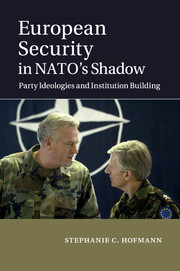Crossref Citations
This Book has been
cited by the following publications. This list is generated based on data provided by Crossref.
Rittberger, Berthold
and
Weiss, Moritz
2014.
Handbuch Internationale Beziehungen.
p.
1.
Chryssogelos, Angelos-Stylianos
2015.
Foreign policy change in a polarized two-party system: Greece and Turkey’s EU candidacy.
Southeast European and Black Sea Studies,
Vol. 15,
Issue. 1,
p.
19.
Mello, Patrick A.
2015.
Unreliable Allies? Democratic Reliability and Coalition Warfare in Iraq.
SSRN Electronic Journal,
Hofmann, Stephanie C.
and
Yeo, Andrew I.
2015.
Business as usual: The role of norms in alliance management.
European Journal of International Relations,
Vol. 21,
Issue. 2,
p.
377.
Haftel, Yoram Z.
2015.
Trade Cooperation.
p.
295.
Hofmann, Stephanie C.
Bravo De Moraes Mendes, Barbara
and
Campbell, Susanna
2016.
Investing in international security: rising powers and organizational choices.
Cambridge Review of International Affairs,
Vol. 29,
Issue. 3,
p.
831.
Haesebrouck, Tim
2016.
Democratic Participation in the Air Strikes Against Islamic State: A Qualitative Comparative Analysis.
Foreign Policy Analysis,
p.
orw035.
Nováky, Niklas I.M.
2016.
Who wants to pay more? The European Union's military operations and the dispute over financial burden sharing.
European Security,
Vol. 25,
Issue. 2,
p.
216.
2017.
Europe's Common Security and Defence Policy.
p.
305.
2017.
Europe's Common Security and Defence Policy.
p.
128.
Hofmann, Stephanie C.
2017.
Party preferences and institutional transformation: revisiting France’s relationship with NATO (and the common wisdom on Gaullism).
Journal of Strategic Studies,
Vol. 40,
Issue. 4,
p.
505.
2017.
Europe's Common Security and Defence Policy.
p.
272.
Schmitt, Olivier
2017.
The Reluctant Atlanticist: France’s Security and Defence Policy in a Transatlantic Context.
Journal of Strategic Studies,
Vol. 40,
Issue. 4,
p.
463.
2017.
Europe's Common Security and Defence Policy.
p.
173.
2017.
Europe's Common Security and Defence Policy.
p.
212.
2017.
Europe's Common Security and Defence Policy.
p.
87.
Smith, Michael E.
2017.
Europe's Common Security and Defence Policy.
Rittberger, Berthold
and
Weiss, Moritz
2017.
Handbuch Internationale Beziehungen.
p.
493.
Haftel, Yoram Z
and
Hofmann, Stephanie C
2017.
Institutional authority and security cooperation within regional economic organizations.
Journal of Peace Research,
Vol. 54,
Issue. 4,
p.
484.
Biermann, Rafael
and
Koops, Joachim A.
2017.
Palgrave Handbook of Inter-Organizational Relations in World Politics.
p.
677.



